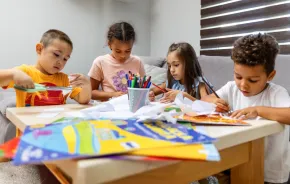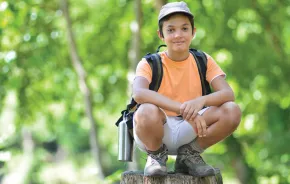
Photo:
Credit: Libby Lewis Photography
Editor's note: This article was sponsored by Epiphany School.
Celia Russo wants parents to know that most “natural leaders” are made, not born, and that true leadership is much more than convincing others to follow you.
“There are so many different elements to leadership. But a lot of it comes down to students feeling empowered to use their voice to impact their community and to be able to see that their actions have meaning and are valued,” says the lower elementary division head at Epiphany School, an independent, non-parochial pre-K through fifth grade school in Seattle’s Madrona neighborhood. This is great news for parents, because it means that leadership can be taught and practiced in incremental steps.
Cultivating courage, confidence, curiosity
When staff at Epiphany School talk about empowering children to use their voice, they mean it literally.
“A key aspect of leadership is ease in communicating with people you don’t know. Students develop poise and confidence as they practice speaking up,” says Allisen Haworth, Epiphany School’s upper elementary division head.

“We build in rungs of a ladder. Throughout every grade level, there are intentional opportunities for children to practice using their voice, asking questions and expressing their opinions respectfully. By the time they’re in fifth grade, our students are clear and visible leaders in the school,” says Russo. Public speaking practice begins in pre-K, with a project called “Family Museum,” in which each child gives a presentation about their family.
“They all make this brave choice to open their mouths and say, ‘What I have to say is important and it’s worth listening to me,’” says Russo. Epiphany School’s skilled teachers help even the shyest students gain confidence and courage as they advance through their elementary school years, learning to work in groups to prepare presentations and participating in theatrical productions — both on stage and behind the scenes. By fifth grade, students present regularly to their peers and help guide school tours for prospective families.
Spotlighting social-emotional learning
“Good leaders are good humans. Social-emotional learning (SEL) really helps students to understand their own strengths and develop as leaders,” says Haworth. Epiphany School uses an approach to social-emotional learning called Responsive Classroom.
“Responsive Classroom is a framework for social-emotional learning that supports five key competencies,” says Russo. The competencies are cooperation, assertiveness, responsibility, empathy and self-control. “Building skill in any one of those is going to make you a better and more successful leader,” she says.

Because every child has different strengths and challenges, the school takes a personalized approach. “A child who’s really comfortable speaking up may need to focus on listening well to become a good leader. We meet students where they are and build from there with increasing responsibility,” says Haworth.
Another way the school helps students build SEL skills is through its cross-grade buddy program, in which older students partner with younger ones. Together, they support classroom projects, write collaborative stories and just hang out. Older buddies are taught to be responsible role models of good social behavior for the younger students.
“Our oldest students still remember what it was like to be a younger buddy and what their older buddy did to make them feel supported, and then they get to practice that as fourth and fifth graders. Recognizing and valuing other’s skills and perspectives naturally builds empathy and confidence, whether you’re a kindergartner receiving the time and attention of a third grader, or a fifth grader reflecting on how much they have matured since their younger buddy days,” says Russo.
Voice, choice, agency
Adults tend to make two mistakes when kids’ curiosity gets fired up: Either we brush them off because their ideas are unrealistic, or we jump in and try to do things for them. To avoid these mistakes, Epiphany School educators ask themselves, “Does my involvement give the child voice, choice and agency?”
As much as possible, teachers allow students to pursue their own passions, whether starting up a school paper or initiating a donation drive. “When we design experiences as educators, we think about how we can help students connect with their curiosity and their interests, and then use them to make a positive impact on the world,” says Haworth. “Sometimes, it’s expediency, sometimes it’s perfectionism that makes parents or caregivers want to rush in and fix things. But the real gift is giving children the opportunity, with support, to handle situations themselves,” says Haworth. Letting a child voice their ideas and pursue their curiosity at home can get messy, but it’s worth cleaning up the occasional spill to let a toddler use the glue themselves or pour their own juice.
Russo adds, “Moments of empowerment may seem small, but they are the little steps that put kids on the path to independence and leadership.”
|
Sponsored by: |

|











